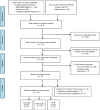Association between coffee or caffeine consumption and fecundity and fertility: a systematic review and dose-response meta-analysis
- PMID: 29276412
- PMCID: PMC5733907
- DOI: 10.2147/CLEP.S146496
Association between coffee or caffeine consumption and fecundity and fertility: a systematic review and dose-response meta-analysis
Abstract
Objective: The aim was to investigate whether coffee or caffeine consumption is associated with reproductive endpoints among women with natural fertility (ie, time to pregnancy [TTP] and spontaneous abortion [SAB]) and among women in fertility treatment (ie, clinical pregnancy rate or live birth rate).
Design: This study was a systematic review and dose-response meta-analysis including data from case-control and cohort studies.
Methods: An extensive literature search was conducted in MEDLINE and Embase, with no time and language restrictions. Also, reference lists were searched manually. Two independent reviewers assessed the manuscript quality using the Newcastle-Ottawa Scale (NOS). A two-stage dose-response meta-analysis was applied to assess a potential association between coffee/caffeine consumption and the outcomes: TTP, SAB, clinical pregnancy, and live birth. Heterogeneity between studies was assessed using Cochrane Q-test and I2 statistics. Publication bias was assessed using Egger's regression test.
Results: The pooled results showed that coffee/caffeine consumption is associated with a significantly increased risk of SAB for 300 mg caffeine/day (relative risk [RR]: 1.37, 95% confidence interval [95% CI]: 1.19; 1.57) and for 600 mg caffeine/day (RR: 2.32, 95% CI: 1.62; 3.31). No association was found between coffee/caffeine consumption and outcomes of fertility treatment (based on two studies). No clear association was found between exposure to coffee/caffeine and natural fertility as measured by fecundability odds ratio (based on three studies) or waiting TTP (based on two studies).
Conclusion: Results from this meta-analysis support the growing evidence of an association between coffee/caffeine intake and the risk of SAB. However, viewing the reproductive capacity in a broader perspective, there seems to be little, if any, association between coffee/caffeine consumption and fecundity. In general, results from this study are supportive of a precautionary principle advised by health organizations such as European Food Safety Authority (EFSA) and World Health Organization (WHO), although the advised limit of a maximum of two to three cups of coffee/200-300 mg caffeine per day may be too high.
Keywords: assisted reproduction; caffeine; coffee; fecundity; fertility; spontaneous abortion.
Conflict of interest statement
Disclosure The authors report no conflicts of interest in this work.
Figures


References
-
- Juul S, Karmaus W, Olsen J. Regional differences in waiting time to pregnancy: pregnancy-based surveys from Denmark, France, Germany, Italy and Sweden. The European Infertility and Subfecundity Study Group. Hum Reprod. 1999;14(5):1250–1254. - PubMed
-
- Schmidt L. Infertility and assisted reproduction in Denmark. Epidemiology and psychosocial consequences. Dan Med Bull. 2006;53:390–417. - PubMed
-
- Jacob MC, McQuillan J, Greil AL. Psychological distress by type of fertility barrier. Hum Reprod. 2007;22(3):885–894. - PubMed
-
- Hermansen K, Bech BH, Dragsted LO, et al. “Kaffe, sundhed og sygdom”, Vidensråd for Forebyggelse. [Coffee, health and disease] 2015. [Accessed November 13, 2017]. Available from: http://www.vidensraad.dk/sites/default/files/vidensrad_for_forebyggelse_.... Danish.
-
- EFSA Panel on Dietetic Products, Nutrition and Allergies (NDA) Scientific Opinion on the safety of caffeine. EFSA J. 2015;13(5):4102.
Publication types
LinkOut - more resources
Full Text Sources
Other Literature Sources

